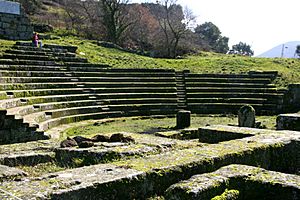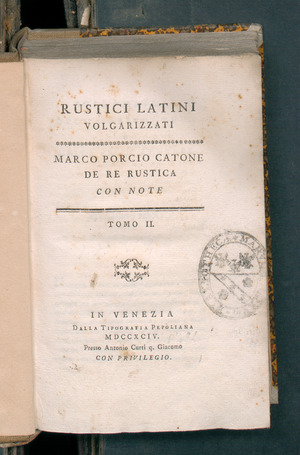Cato the Elder facts for kids
Quick facts for kids
Marcus Porcius Cato
|
|
|---|---|
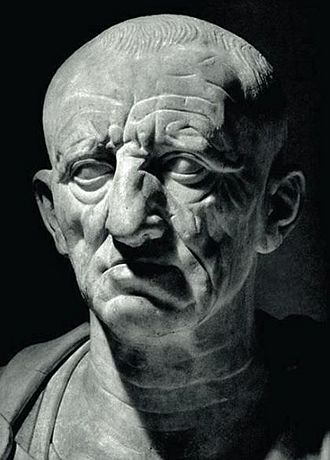
The Patrician Torlonia bust thought to be of Cato the Elder
|
|
| Born | 234 BC Tusculum, Roman Republic
|
| Died | 149 BC (aged 85) Roman Republic
|
|
Notable work
|
De Agri Cultura |
| Office | Tribune (214 BC) Quaestor (204 BC) Aedile (199 BC) Praetor (198 BC) Consul (195 BC) Censor (184 BC) |
| Spouse(s) |
|
| Children |
|
| Military service | |
| Allegiance | Roman Republic |
| Battles/wars | |
Marcus Porcius Cato (234–149 BC), also known as Cato the Censor or Cato the Elder, was a very important Roman soldier, senator, and historian. He was famous for his traditional Roman values and for being against too much Greek influence in Rome.
Cato was the first person to write a history of Rome in Latin. This work was called Origines. His other famous book, De agri cultura (On Agriculture), is the oldest complete book written in Latin prose that we still have today. He is called "the Elder" to tell him apart from his great-grandson, Cato the Younger.
Cato came from a family of ordinary Roman citizens (called Plebeians) who were known for their military service. Like his ancestors, he loved farming when he wasn't serving in the army. A powerful Roman named Lucius Valerius Flaccus noticed Cato's talents. Flaccus helped Cato move to Rome and start a political career.
Cato held many important government jobs. He was a military tribune (214 BC), quaestor (204 BC), aedile (199 BC), praetor (198 BC), consul (195 BC), and censor (184 BC). As praetor, he kicked out people who charged very high interest rates (usurers) from Sardinia. As censor, he worked hard to protect Rome's old traditions and fight against new Greek ideas.
Contents
Cato's Early Life and Family
Cato the Elder was born in a town called Tusculum, just like his family for many generations. His father was known as a brave soldier. Even though his family had a good reputation, they had never held high political offices in Rome. This meant Cato was a "new man" (novus homo) when he started his career in Rome. He was the first in his family to reach such high positions.
What Does the Name Cato Mean?
Cato's ancestors were all named Marcus Porcius. It's said that he was first known as Priscus, but later he was called Cato. The word "Cato" comes from a Latin word meaning 'common sense that comes from natural wisdom and experience'. This name probably showed how wise and practical he was.
He was also known as Sapiens (meaning 'wise man') in his old age. But "Cato the Censor" and "Cato the Elder" are his most common names today. This is because he did an amazing job as Censor, and he was the only Cato to ever hold that office.
When Was Cato Born?
Historians figure out Cato's birth year from how old he was when he died in 149 BC. According to the Roman writer Cicero, Cato was born in 234 BC and died at 85 years old. Other writers said he was older, but Cato himself mentioned his age in a way that supports Cicero's date.
Cato's Youth and the Punic Wars
After his father died, a young Cato inherited a small farm in the Sabine region. He spent most of his childhood there, learning about farming and managing the land. Near his farm was a small hut that belonged to Manius Curius Dentatus, a famous Roman soldier known for his simple and strict life. Cato was inspired by Dentatus and wanted to be just as glorious.
Fighting in the Punic Wars
A big chance for military action came in 218 BC when Hannibal Barca attacked Rome's allies, starting the Second Punic War. Cato served in the army at a young age. In 214 BC, he was at Capua. He also fought at the siege of Tarentum in 209 BC.
Two years later, Cato joined Consul Claudius Nero on a march north to stop Hasdrubal Barca. Cato's actions helped the Romans win the important Battle of Metaurus, where Hasdrubal was killed. Later in life, Cato gave many strong speeches, often ending with "Carthago delenda est", which means "Carthage must be destroyed."
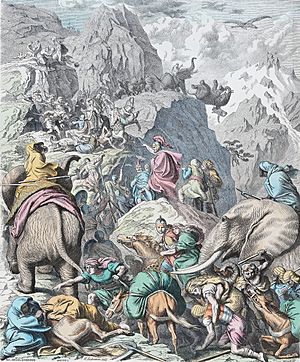
Life Between Wars
When he wasn't fighting, Cato went back to his Sabine farm. He dressed simply and worked alongside his farm laborers. Even though he was young, his neighbors admired his tough lifestyle and his wise sayings. He was always ready to help his neighbors, often settling arguments or speaking for them in local court cases. This helped him practice his public speaking skills and learn about people.
A Follower of Old Roman Ways
Near Cato's farm lived Lucius Valerius Flaccus, a young nobleman from a powerful family. Flaccus noticed Cato's energy, military skill, good speaking abilities, and his simple, traditional way of life. Flaccus belonged to a group of Romans who believed in the strict, old Roman virtues.
At this time, Roman society was changing. Many Romans were starting to enjoy Greek culture and luxury. But some nobles, like Flaccus, thought this was bad. They preferred the old, simple Roman ways. Cato's friends, Fabius and Flaccus, were leaders in this group that defended the old traditions.
Starting a Political Career
Flaccus was a smart politician who looked for talented young men to support him. He knew that success in the army and good speaking skills were highly valued in Rome. He also knew that for someone like Cato, who wasn't from a famous Roman family, the only way to get into high office was through success in the Roman Forum (the center of Roman public life).
So, Flaccus advised Cato to enter Roman politics. Cato took his advice, and with Flaccus's support, he began to make a name for himself in the Forum. He soon became a candidate for public office.
Cato's Military and Political Journey
Becoming a Quaestor
In 205 BC, Cato was chosen as a quaestor, a financial officer. The next year (204 BC), he went with Publius Cornelius Scipio Africanus Major to Sicily. Scipio wanted to take his army from Sicily to Africa to fight Carthage. Cato and another officer were sent to escort the supply ships.
However, Cato and Scipio didn't get along well. Cato was very traditional and thought Scipio's troops were too relaxed and that Scipio spent too much money. Cato complained to the Senate in Rome about Scipio's spending. Some sources say a group was sent to Sicily to check on Scipio, but they found he was doing a good job preparing for the invasion.
Aedile and Praetor
In 199 BC, Cato was elected aedile, an officer in charge of public works and games. He helped bring back the Plebeian Games and hosted a big dinner for the god Jupiter.
In 198 BC, he became a praetor, a judge and military commander. He was sent to govern Sardinia. There, he immediately showed his strict moral beliefs. He cut down government spending, traveled with only one assistant, and lived a simple life, unlike other rich officials. He made sure justice was fair and punished people who charged extremely high interest rates (usury).
Cato as Consul
In 195 BC, when he was 39, Cato was elected consul alongside his old friend Flaccus. During his time as consul, he passed the first two of the Porcian Laws. These laws gave more protection to Roman citizens from harsh or unfair punishments.
The Oppian Law Debate
In 215 BC, during the Second Punic War, a law called the Oppian Law was passed. It was meant to save money for Rome by limiting women's luxury. For example, women couldn't own more than half an ounce of gold or wear colorful clothes.
After Rome defeated Hannibal and became rich, some tribunes wanted to get rid of the Oppian Law. Other tribunes opposed this. This debate became very popular. Roman women crowded the streets, asking their husbands and officials to bring back their right to wear traditional ornaments.
Even Flaccus hesitated, but Cato was firm. He gave a strong speech against repealing the law. In the end, the law was repealed, and women celebrated by walking through the streets in their fancy clothes. Despite his strong opposition, Cato's popularity didn't seem to suffer. He then sailed to his assigned province, Hispania Citerior (part of modern Spain).
Campaign in Hispania
In Hispania, Cato was known for his hard work and quick thinking. He lived simply, sharing food and labor with his soldiers. He personally oversaw his orders and moved quickly to win battles. He was clever, sometimes turning one local tribe against another and hiring native fighters.
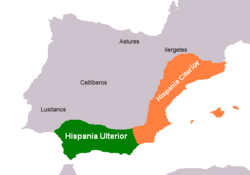
Cato was very harsh in Hispania, bringing the region under Roman control quickly. He destroyed many towns and took a lot of treasure. He even coined the phrase "bellum se ipsum alet" – "the war feeds itself" – meaning the army could live off the land and what it captured. He claimed to have destroyed more towns in Hispania than he had spent days there.
A Roman Triumph
After bringing order to Hispania, Cato focused on improving the province's economy. He made changes to the iron and silver mines, which increased Rome's income. For his success in Hispania, the Senate gave him a three-day thanksgiving ceremony.
In 194 BC, he returned to Rome and was honored with a Roman triumph, a grand parade celebrating his victory. He showed off huge amounts of captured bronze, silver, and gold. He even gave money to his soldiers, which was generous for someone known for being thrifty.
Defending His Consulship
Cato's return seemed to increase the rivalry with Scipio Africanus. Scipio was consul in 194 BC and wanted to command the province Cato had just made famous. Cato used his great speaking skills and detailed financial reports to defend his time as consul against any criticism.
Later Military Service
Battle of Thermopylae
Cato's military career wasn't over. In 191 BC, he served as a general (legatus) under Consul Manius Acilius Glabrio in Greece. They were there to fight Antiochus III the Great, the king of the Seleucid Empire.
In the important Battle of Thermopylae (191 BC), Cato showed his usual bravery. He made a daring move, surprising and defeating some of the enemy's soldiers on a high mountain peak. Then, he came down from the hills and attacked the enemy camp from above. This surprise attack caused panic and helped the Romans win the battle, ending Antiochus's invasion of Greece. The consul praised Cato greatly for the victory.
After the battle, Cato was sent back to Rome by Glabrio to announce the victory. He traveled so fast that he reported to the Senate before another general, who had left Greece days earlier, even arrived!
Cato's Influence in Rome
With his reputation as a soldier firmly established, Cato chose to serve Rome at home. He closely watched the behavior of politicians and generals. He was a strong force behind the accusations of corruption against the Scipio family (Africanus and Asiaticus). Even Scipio Africanus, a hero who defeated Hannibal, had to leave Rome for a while because of the pressure. Cato's dislike for Scipio started during the African campaign, when he disagreed with Scipio's generous spending and luxurious lifestyle.
Cato the Censor
Cato was also against the spread of Greek culture, which he believed would destroy the strong, simple Roman way of life. This was most clear during his time as censor (184 BC), which is why he is often called "Cato the Censor."
As censor, he strictly reviewed the lists of senators and knights. He removed anyone he thought was unworthy, either for moral reasons or because they didn't meet the wealth requirements. Senators were expected to be very wealthy, earning money from land, not trade.
Cato also made very strict rules against luxury. He put heavy taxes on fancy clothes, jewelry, especially for women, and on young slaves bought as favorites. He supported laws that limited the number of guests at parties and tried to stop women from accumulating too much wealth.
Public Works and Reforms
Cato also worked on many public projects. He repaired aqueducts (water channels), cleaned the sewers, and stopped people from illegally taking public water for their own use. He ordered houses that blocked public roads to be torn down. He also built the first basilica (a large public building) in the Roman Forum near the Curia (the Senate House).
He increased the fees paid by tax collectors and lowered the prices for building public works. This showed his dedication to managing Rome's money wisely.
Cato's Final Years
After his censorship in 184 BC until his death in 149 BC, Cato didn't hold public office. But he continued to be a strong voice in the Senate, always opposing new ideas. He was horrified by the wild Bacchanalian religious ceremonies, which he blamed on Greek influence. He strongly urged that Greek philosophers who visited Rome be sent away because he thought their ideas were dangerous. He also warned against Chaldean astrologers.
Cato didn't like doctors, who were mostly Greeks. He helped free the historian Polybius and other Greek prisoners, saying the Senate had more important things to do than debate if a few Greeks should die in Rome or their own land. It wasn't until he was 80 that he supposedly started learning Greek literature, though some think he knew Greek much earlier.
In his last years, Cato was famous for strongly pushing for the Third Punic War and the destruction of Carthage. In 157 BC, he visited Carthage and was amazed by how prosperous it was. He became convinced that Rome would only be safe if Carthage was completely destroyed. From then on, he ended every speech in the Senate, no matter the topic, with the famous phrase: "Carthage must be destroyed!"
Cato believed that life was a constant discipline, both for individuals and for the state. He was a strict husband, a firm father, and a demanding master to his slaves. While this might seem harsh today, Romans at the time respected it as a traditional example of old Roman values.
Cato's Writings
Cato was also a very important writer. He was the first significant Latin prose writer and the first to write a history of Italy in Latin. Some historians believe that if it weren't for Cato's writings, Latin might not have become the main literary language of Rome.
- His book De agri cultura (On Agriculture) is his only complete work that still exists. Written around 160 BC, it's a collection of rules for farming and managing a farm. It gives us a glimpse into country life in the 2nd century BC. The book assumes the farm is run by slaves. Cato gives advice on hiring slave groups for olive harvests and even chilling advice on keeping slaves constantly working, reducing their food when sick, and selling old or sickly slaves. This book was widely read and quoted. Cato thought vineyards were the most important part of a farm because wine trade was very profitable.
- The Origines (Origins) was a seven-book history written around 168 BC. Only fragments of it survive. It told the history of Italian towns, focusing on Rome, from their legendary beginnings to Cato's own time. Cato wrote it to teach Romans what it meant to be Roman and to teach his own son to read. The early parts of the book are full of legends that show Roman virtues. It also argued that other Italian towns were important and that Romans were better than Greeks. This book was a source for Virgil's famous poem, the Aeneid.
- During the Roman Empire, there was a collection of about 150 of Cato's political speeches. In these speeches, he pushed his political ideas, argued with opponents, and fought against what he saw as Rome's moral decline. We don't even know the titles of all these speeches, but parts of some still exist. Cato even included parts of his speeches in his history book, the Origines.
- Other lost works include On Soldiery (a practical guide like his farming manual) and On the Law Relating to Priests and Augurs.
- He also wrote Praecepta ad Filium (Maxims addressed to his son) and Carmen de moribus (Poem on morality), which was actually in prose.
Cato's Legacy
- A system of wrinkle ridges on the Moon is named Dorsa Cato after him.
- The town of Monte Porzio Catone in Italy is named in honor of the Porcius Cato family.
- Cato is played by Vittorio Gassman in the 1971 Italian film Scipione detto anche l'Africano.
Family Tree
| Cato the Elder family tree | |||||||||||||||||||||||||||||||||||||||||||||||||||||||||||||||||||||||||||||||||||||||||||||||||||||||||||||||||||||||||||||||||||||||||||||||||||||||||||||||||||||||||||||||||||||||||||||||||||||||||||||||||||||||||||||||||||||||||||||||||||||||||||||||||||||||||||||||||||||||||||||||||||||||||||||||||||||||||||||||||||||||||||||||||||||||||||||||||||||||||||||||||||||||||||||||||||||||||||||||||||||||||||||||||||||||||||||||||||||||||||||||||||||||||||||||||||||||||||||||||||||||||||||||||||||||||||||||||||||||||||||||||||||||||||||||||||||||||||||||||||||||||||||||||||||||||||||||||||||||||||||||||||||||||||||||||||||||||||||||||||||||||||||||||
|---|---|---|---|---|---|---|---|---|---|---|---|---|---|---|---|---|---|---|---|---|---|---|---|---|---|---|---|---|---|---|---|---|---|---|---|---|---|---|---|---|---|---|---|---|---|---|---|---|---|---|---|---|---|---|---|---|---|---|---|---|---|---|---|---|---|---|---|---|---|---|---|---|---|---|---|---|---|---|---|---|---|---|---|---|---|---|---|---|---|---|---|---|---|---|---|---|---|---|---|---|---|---|---|---|---|---|---|---|---|---|---|---|---|---|---|---|---|---|---|---|---|---|---|---|---|---|---|---|---|---|---|---|---|---|---|---|---|---|---|---|---|---|---|---|---|---|---|---|---|---|---|---|---|---|---|---|---|---|---|---|---|---|---|---|---|---|---|---|---|---|---|---|---|---|---|---|---|---|---|---|---|---|---|---|---|---|---|---|---|---|---|---|---|---|---|---|---|---|---|---|---|---|---|---|---|---|---|---|---|---|---|---|---|---|---|---|---|---|---|---|---|---|---|---|---|---|---|---|---|---|---|---|---|---|---|---|---|---|---|---|---|---|---|---|---|---|---|---|---|---|---|---|---|---|---|---|---|---|---|---|---|---|---|---|---|---|---|---|---|---|---|---|---|---|---|---|---|---|---|---|---|---|---|---|---|---|---|---|---|---|---|---|---|---|---|---|---|---|---|---|---|---|---|---|---|---|---|---|---|---|---|---|---|---|---|---|---|---|---|---|---|---|---|---|---|---|---|---|---|---|---|---|---|---|---|---|---|---|---|---|---|---|---|---|---|---|---|---|---|---|---|---|---|---|---|---|---|---|---|---|---|---|---|---|---|---|---|---|---|---|---|---|---|---|---|---|---|---|---|---|---|---|---|---|---|---|---|---|---|---|---|---|---|---|---|---|---|---|---|---|---|---|---|---|---|---|---|---|---|---|---|---|---|---|---|---|---|---|---|---|---|---|---|---|---|---|---|---|---|---|---|---|---|---|---|---|---|---|---|---|---|---|---|---|---|---|---|---|---|---|---|---|---|---|---|---|---|---|---|---|---|---|---|---|---|---|---|---|---|---|---|---|---|---|---|---|---|---|---|---|---|---|---|---|---|---|---|---|---|---|---|---|---|---|---|---|---|---|---|---|---|---|---|---|---|---|---|---|---|---|---|---|---|---|---|---|---|---|---|---|---|---|---|---|---|---|---|---|---|---|---|---|---|---|---|---|---|---|---|---|---|---|---|---|---|---|---|---|---|---|---|---|---|---|---|---|---|---|---|---|---|---|---|---|---|---|---|---|---|---|---|---|---|---|---|---|---|---|---|---|---|---|---|---|---|---|---|---|---|---|---|---|---|---|---|---|---|---|---|---|---|---|---|---|---|---|---|---|---|---|---|---|---|---|---|---|---|---|---|---|---|---|---|---|---|---|---|---|---|---|---|---|---|---|---|---|---|---|---|---|---|---|---|---|---|---|---|---|---|---|---|---|---|---|---|---|---|
|
|||||||||||||||||||||||||||||||||||||||||||||||||||||||||||||||||||||||||||||||||||||||||||||||||||||||||||||||||||||||||||||||||||||||||||||||||||||||||||||||||||||||||||||||||||||||||||||||||||||||||||||||||||||||||||||||||||||||||||||||||||||||||||||||||||||||||||||||||||||||||||||||||||||||||||||||||||||||||||||||||||||||||||||||||||||||||||||||||||||||||||||||||||||||||||||||||||||||||||||||||||||||||||||||||||||||||||||||||||||||||||||||||||||||||||||||||||||||||||||||||||||||||||||||||||||||||||||||||||||||||||||||||||||||||||||||||||||||||||||||||||||||||||||||||||||||||||||||||||||||||||||||||||||||||||||||||||||||||||||||||||||||||||||||||
See also
 In Spanish: Catón el Viejo para niños
In Spanish: Catón el Viejo para niños
- Ancient Rome and wine – Learn about Cato's ideas on Roman winemaking.
- Lucius Quinctius Cincinnatus – Another famous Roman known for his simple life.
- Pliny the Elder – A later Roman writer and naturalist.
 | May Edward Chinn |
 | Rebecca Cole |
 | Alexa Canady |
 | Dorothy Lavinia Brown |


